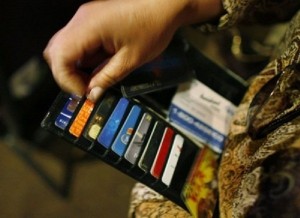Jobless man nabbed for ID theft, attempt to use uncle’s credit card
Joseph Nicol Ong, 43, was arrested in an entrapment operation in Parañaque City after presenting fake IDs to claim the credit cards delivered to him but bearing the name of his uncle.
With the arrest of Ong, the Philippine National Police Anti-Cybercrime Group warned the public anew on identity theft, especially with the hacking and leak of data from the Commission on Elections website.
Senior Supt. Guillermo Lorenzo Eleazar, ACG chief, said the public should take the necessary precautions to avoid identity theft in financial transactions, in connection with the “Comeleak.”
Ong was arrested last Friday afternoon outside his uncle’s home in the Green Heights Subdivision after he waited for the bank messenger delivering the credit cards to him.
His duplicity was busted by the Union Bank of the Philippines, which reported to the ACG an impostor who wanted to get access to the credit cards of their client, Ong’s uncle.
Article continues after this advertisementThe impostor called the bank’s customer service and reported that he left his credit cards inside a cab.
Article continues after this advertisementThe caller tried to pass himself off as his uncle, a businessman, during the positive identification procedure and even asked to update his contact information, such as his email address and cell phone number.
The bank, however, saw through the ruse and reported the attempt to the ACG, which set up an entrapment operation against the con artist.
At around 12:50 p.m. last Friday, a policeman pretending to be a bank messenger delivered the credit cards to the address of the real client.
However, Ong was waiting outside his uncle’s house and claimed to be his uncle, presenting a driver’s license and voter’s ID, which bore his uncle’s data but the suspect’s own photograph.
The suspect was arrested as he received the credit cards bearing his uncle’s name, Eleazar said.
Ong was charged for violating Republic Act 8484 or the Access Device Regulations Act, RA 10175 or the Cybercrime Prevention Act and the Revised Penal Code for falsifying documents.
Eleazar pointed out that an individual or syndicate could gather a victim’s personal details, leaving the victim with a large debt, a negative credit history, and with legal implications.
“We want the public to be aware of securing personal documents and information that can be obtained from utility bills, IDs, receipts, social media posts, etc,” he said.
Internet users should be wary of e-mails claiming to be from financial institutions or other legitimate organizations, which ask the recipients to update their security details and password through a fake but authentic-looking website.
The ACG issued the following tips to prevent identity theft:
* Improve security precautions by using strong email passwords and changing them regularly;
* Refrain from opening unknown emails and attachments which may contain malware;
* Install an anti-virus program and firewall on computers and update the software as needed;
* Keep personal information off social media. Be careful in posting anything on social media which could provide information on location and accessibility;
* Keep your credit card and its details always safe;
* Be careful in giving information on web purchases;
* Do not surf the web while accessing online banking accounts. Ensure that only your online banking site is open;
* Do not engage in sensitive transactions online.
* Monitor online account activities;
* Separate passwords for online banking and non-banking accounts;
* Subscribe to text and email notifications and alerts from your financial services institution; and,
* Cooperate with the banks on the update adjustments to improve online security and customer identification and verification processes.
Eleazar added that they have been coordinating with banks in beefing up their security systems and protocols to counter financial fraud. SFM
